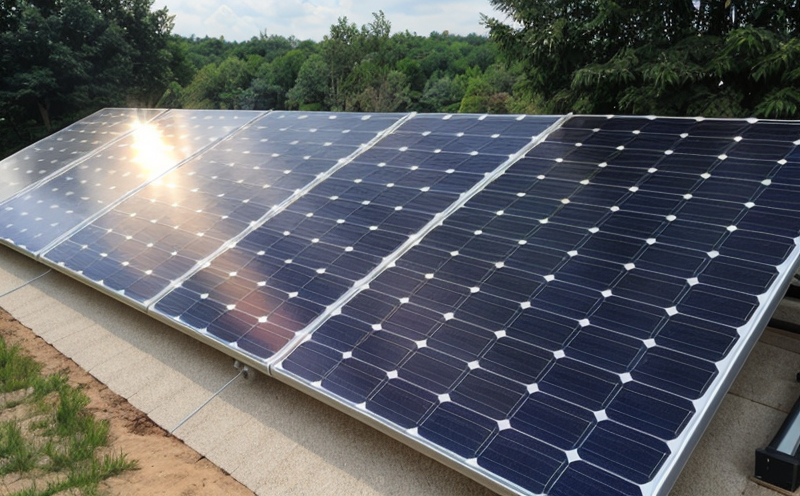
-
Renewable Energy Testing and Standards-
Solar Panel Manufacturing Standards and Certification-
Certification for Solar Panel Coatings and Protection
We provide comprehensive solutions designed to help our clients mitigate risks, enhance performance, and excel in key areas such as quality, health & safety, environmental sustainability, and social responsibility.
Discover
For many years, our organization has been operating successfully, boasting modern laboratories that meet international standards. These laboratories are equipped with the latest technology devices and equipment, and we have built a strong team of experienced and trained personnel to operate them.
DiscoverWelcome to Eurolab, your partner in pioneering solutions that encompass every facet of life. We are committed to delivering comprehensive Assurance, Testing, Inspection, and Certification services, empowering our global clientele with the ultimate confidence in their products and processes.
Discover
-
Renewable Energy Testing and Standards-
Solar Panel Manufacturing Standards and Certification-
Certification for Solar Panel Coatings and ProtectionCertification for Solar Panel Coatings and Protection: A Comprehensive Guide
The solar panel industry has experienced significant growth in recent years, driven by increasing demand for renewable energy sources and declining technology costs. As the demand for solar panels continues to rise, manufacturers are under pressure to produce high-quality products that meet strict standards and regulations. One crucial aspect of ensuring the quality and longevity of solar panels is certification for coatings and protection.
Why Certification Matters
Solar panel coatings play a critical role in protecting the panels from environmental degradation, reducing energy losses, and maintaining their performance over time. However, not all coatings are created equal, and some may contain materials that can compromise the integrity of the panels or pose risks to human health and safety. Thats why certification is essential for solar panel coatings and protection.
Certification ensures that coatings meet specific standards and requirements, which can vary depending on factors such as climate, geographical location, and intended application. For example, coatings designed for use in coastal areas may need to withstand exposure to saltwater and high humidity, whereas those for desert regions might require UV resistance.
Key Considerations for Certification
When it comes to certification for solar panel coatings and protection, several key considerations come into play:
Document control
Record keeping
Internal audits
Corrective and preventive action
Continual improvement
Materials (e.g., coatings, paints)
Performance (e.g., solar reflectance, transmittance)
Safety and health risks
Labeling and packaging requirements
Physical properties (e.g., thickness, adhesion)
Chemical resistance
Weathering performance (e.g., UV stability)
Compatibility with solar panel materials

Energy and Sustainability Standards
In today’s rapidly evolving world, businesses face increasing pressure to meet global energy a...

Railway Industry Compliance
Railway Industry Compliance: Ensuring Safety and Efficiency The railway industry is a critical comp...

Electromechanical Safety Certification
Electromechanical Safety Certification: Ensuring Compliance and Protecting Lives In todays intercon...

Military Equipment Standards
Military Equipment Standards: Ensuring Effectiveness and Safety The use of military equipment is a ...

MDR Testing and Compliance
MDR Testing and Compliance: A Comprehensive Guide The Medical Device Regulation (MDR) is a comprehe...

Chemical Safety and Certification
Chemical safety and certification are critical in ensuring the safe management of products and proce...

Agricultural Equipment Certification
Agricultural equipment certification is a process that ensures agricultural machinery meets specific...

Pharmaceutical Compliance
Pharmaceutical compliance refers to the adherence of pharmaceutical companies and organizations to l...

Food Safety and Testing
Food Safety and Testing: Ensuring the Quality of Our Food As consumers, we expect our food to be sa...

Product and Retail Standards
Product and Retail Standards: Ensuring Quality and Safety for Consumers In todays competitive marke...

Trade and Government Regulations
Trade and government regulations play a vital role in shaping the global economy. These regulations ...

IT and Data Center Certification
IT and Data Center Certification: Understanding the Importance and Benefits The field of Informatio...

Construction and Engineering Compliance
Construction and Engineering Compliance: Ensuring Safety, Quality, and Regulatory Adherence In the ...

Healthcare and Medical Devices
The Evolution of Healthcare and Medical Devices: Trends, Innovations, and Challenges The healthcare...

Renewable Energy Testing and Standards
Renewable Energy Testing and Standards: Ensuring a Sustainable Future The world is rapidly transiti...

Automotive Compliance and Certification
Automotive Compliance and Certification: Ensuring Safety and Efficiency The automotive industry is ...

Cosmetic Product Testing
The Complex World of Cosmetic Product Testing The cosmetics industry is a multi-billion-dollar ma...

Fire Safety and Prevention Standards
Fire Safety and Prevention Standards: Protecting Lives and Property Fire safety and prevention stan...

Pressure Vessels and Installations Testing
Pressure Vessels and Installations Testing Pressure vessels are a critical component of various ind...

Environmental Simulation Testing
Environmental Simulation Testing: A Comprehensive Guide In todays world, where technology is rapidl...

Industrial Equipment Certification
Industrial equipment certification is a critical process that ensures industrial equipment meets spe...

Battery Testing and Safety
Battery Testing and Safety: A Comprehensive Guide As technology continues to advance, battery-power...

Aviation and Aerospace Testing
Aviation and Aerospace Testing: Ensuring Safety and Efficiency The aviation and aerospace industr...

NEBS and Telecommunication Standards
Network Equipment Building System (NEBS) and Telecommunication Standards The Network Equipment Bu...

Electrical and Electromagnetic Testing
Electrical and Electromagnetic Testing: A Comprehensive Guide Introduction Electrical and electrom...

Transportation and Logistics Certification
Transportation and Logistics Certification: A Comprehensive Guide The transportation and logistics ...

Lighting and Optical Device Testing
Lighting and Optical Device Testing: Ensuring Performance and Safety Lighting and optical devices a...

Environmental Impact Assessment
Environmental Impact Assessment: A Comprehensive Guide Environmental Impact Assessment (EIA) is a c...

Hospitality and Tourism Certification
Hospitality and Tourism Certification: Unlocking Opportunities in the Industry The hospitality and ...

Consumer Product Safety
Consumer Product Safety: Protecting Consumers from Harmful Products As a consumer, you have the rig...